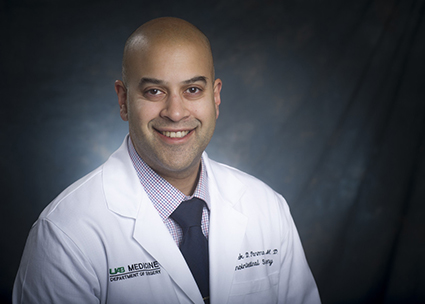Media contact: Adam Pope
 Abhisek Parmar, M.D., Division of Gastrointestinal SurgeryMany people suffer from acid reflux, also known as gastroesophageal reflux disease, or GERD, and it can be quite discomforting. Christine Reeves knows that pain all too well. For years she suffered from GERD, taking over-the-counter medications that did not seem to help.
Abhisek Parmar, M.D., Division of Gastrointestinal SurgeryMany people suffer from acid reflux, also known as gastroesophageal reflux disease, or GERD, and it can be quite discomforting. Christine Reeves knows that pain all too well. For years she suffered from GERD, taking over-the-counter medications that did not seem to help.
Finally, after waking up with an unusual pain every morning for six months, she contacted a gastroenterologist who eventually referred her to Abhisek Parmar, M.D., assistant professor in the University of Alabama at Birmingham’s Division of Gastrointestinal Surgery.
“It started out small and mild, then spread out and got more intense — from about a two to a seven on the pain scale, then slowly subsided,” Reeves said. “It was as if the acid in my stomach pooled while I slept, and as soon as I turned over to wake up, it spread out.”
Parmar determined the source of her symptoms was GERD caused by a hiatal hernia. Rather than Reeves’ taking various medications for the rest of her life, Parmar suggested a procedure known as LINX. LINX, he said, would help eliminate Reeves’ acid reflux.
“LINX surgery is an anti-reflux operation that involves making five small incisions and placing a magnetic sphincter device around the esophagus,” Parmar explained. “The device contracts after someone eats food, preventing acid from refluxing into the chest. The prior operation for reflux is difficult to reverse and can have significant side effects; but LINX has the potential to replace the old procedure, avoid many of its complications and allow for a faster return to normal diet.”
The prior operation, known as the Nissen fundoplication, consists of wrapping part of the existing stomach around the esophagus to reinforce the esophagus walls, preventing acid from entering the chest. The operation can have some side effects, including bloating and inability to belch or vomit. Following Nissen surgery, patients cannot eat normal food for at least four to six weeks.
The LINX procedure was a huge success for Reeves, who was awake and eating in the recovery room soon after. Her pain mostly disappeared after two days, allowing her to return to work only one week after the operation.
Gastroesophageal reflux happens when the acid inside your stomach backs out of the stomach into the esophagus. When the acid touches your esophagus, it can create a burning sensation in your chest or neck, known as heartburn. According to the American College of Gastroenterology, 60 million Americans report having heartburn at least once a month, and some studies report that more than 15 million Americans have symptoms every day. However, when your symptoms are frequent enough to impact your well-being, you could have GERD.
“I heard that the previous surgical fix for GERD was irreversible and did not allow for burping as well as some other restrictions,” Reeves said. “This may seem like a small matter, but it didn’t sound ideal to me. Therefore, the LINX procedure seemed a more reasonable option. I was very pleased with Dr. Parmar and his staff, and I highly recommend them and the surgery. I no longer have to take medications and the GERD is completely gone.”
To schedule a LINX consultation appointment, contact the Division of Gastrointestinal Surgery at 205-975-3000.